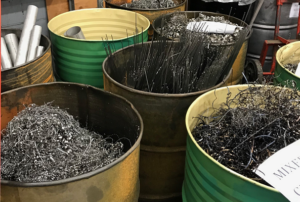Maybe you’ve heard about scrapping but aren’t quite sure what it is, whether your business is supposed to be doing it, or whether it’s worth the effort. The scrapping definition is pretty easy to guess at (spoiler: it involves scrap metal!). Why it matters, though? There are both financial and environmental answers to that question. And as for whether you’re supposed to be doing it, well—it depends on what kind of waste your business generates.
Recycling 101: A Scrapping Definition
 First, an overview of scrap metal, or scrap for short. This term encompasses any kind of metal that can be recycled. Scrap is generally composed of metal that’s no longer being used for its original purpose. Building renovations generally result in lots of scrap, such as old plumbing fixtures, screen doors and windows, copper wiring and steel appliances. Obsolete metal furniture like filing cabinets and iron patio chairs can be scrapped, as can old cars and large pieces of equipment. Manufacturers that use metal in their production processes might also generate some scrap as a byproduct.
First, an overview of scrap metal, or scrap for short. This term encompasses any kind of metal that can be recycled. Scrap is generally composed of metal that’s no longer being used for its original purpose. Building renovations generally result in lots of scrap, such as old plumbing fixtures, screen doors and windows, copper wiring and steel appliances. Obsolete metal furniture like filing cabinets and iron patio chairs can be scrapped, as can old cars and large pieces of equipment. Manufacturers that use metal in their production processes might also generate some scrap as a byproduct.
Metal is highly recyclable, so recyclers pay individuals and businesses for their scrap metal, then sell it to manufacturers who make it into new products. So, a simple scrapping definition is “collecting scrap metal for recycling.” Most kinds of metal can be scrapped, with the exception of those that are dangerous (like radioactive metals, which few people have access to anyway).
Scrap is separated into ferrous and non-ferrous categories. Ferrous metals and alloys are made with iron. Steel, wrought iron and cast iron are common examples of ferrous metals. It’s easy to identify ferrous metals because they have magnetic properties, so a magnet can help you distinguish what kind of metals you have. Ferrous metals can also be damaged by rust. Non-ferrous metals, which include brass, copper, aluminum and tin, don’t include iron and aren’t magnetic. Non-ferrous metals are also impervious to rust. Ferrous metal is the most recycled material in the world.
Why Scrapping Matters
From the perspective of the person collecting metal for scrapping, the goal is generally to make money. Prices vary by metal type, and also vary day-by-day depending on the current market for each type of material. Non-ferrous metals tend to have a higher dollar value than ferrous metals because they’re less commonly recycled and therefore there’s greater demand for these materials, but what a scrapper can earn really depends on what metals they have, and how much. For example, following a building demolition, a site might have wiring, fixtures and metal tubes and pipes. It all has a value, but the copper scrap will earn more than brass.
Getting paid top dollar for your scrap metal is, of course, a great reason to turn scrap over to a recycler. But like with other kinds of recycling, the environmental benefits may also motivate scrappers. Keeping metal out of landfills slows down the rate at which they fill up, so there’s less demand for new landfills to be created. Processing existing scrap to be reused is much less intensive than creating new metal, using less natural resources and reducing greenhouse gas emissions.
Plus, scrap recycling is a job creator. The U.S. scrap industry supports “more than 534,000 well-paying jobs while generating nearly $117 billion in economic activity and $13.2 billion in federal, state, and local tax revenue,” according to the 2018 Recycling Industry Yearbook created by The Institute of Scrap Recycling Industries. Scrap is collected and sorted by U.S. recyclers, while much of it ends up being exported to other countries for processing.
Does your business have metal fixtures and old office equipment collecting dust in storage? Are you planning a major renovation, or cleaning out your facility in advance of a move or shutdown? Scrapping that metal lets you recoup some of your costs and dispose of these materials in an environmentally responsible way. Miller Recycling pays competitively for scrap metal, with both pickup and drop-off services. Contact Miller Recycling to learn more about your options and start earning cash for your scrap metal.

